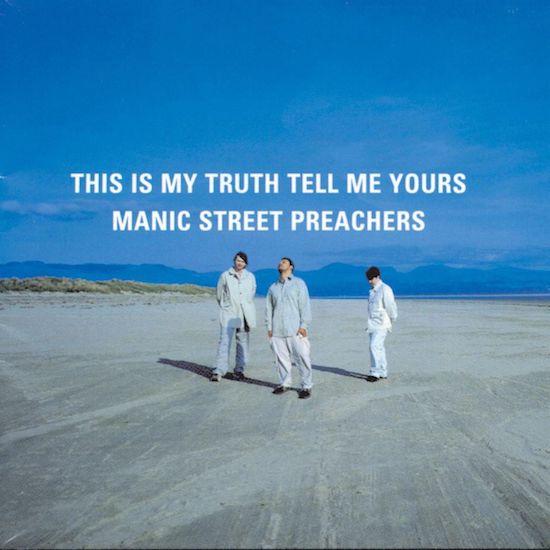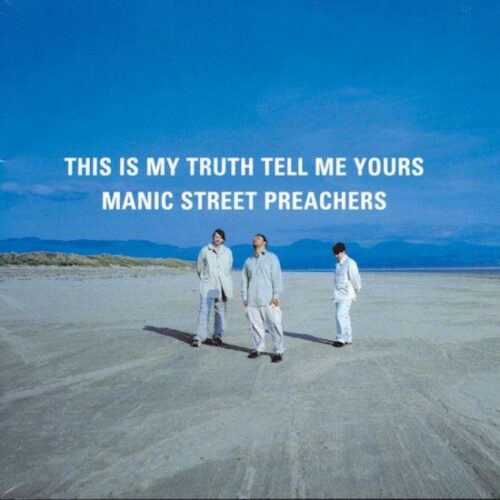This Is My Truth Tell Me Yours holds a strange place in the Manics canon. It is their biggest album and also their most divisive. Although the group’s core followers are as dedicated as they come, This Is My Truth…’s shift towards the glossy, the poppy and the calculatedly anthemic was a test of their resolve as the band went full-on mainstream. The Manics were, for some, no longer theirs.
So polished was the original record that if the re-release sounds dated, it’s only because these hits have been so big for so long. Sonically the band are at their crispest, from the gentle melancholy of ‘The Everlasting’ to the hypnotic arpeggios of ‘Tsunami’, everything has a slickness and shimmer. Those rushing swells of string-draped emotion have never sounded so grand. Of course whether that’s a good thing or not depends on your view of the record to begin with; there’s a hell of a lot of rushing swells.
Perhaps that’s why The Manics have taken the unusual approach of substituting a track from the original record. ‘Nobody Loved You’ does not appear here, aside from a demo version. In its place is ‘Prologue To History’, originally the B-side to ‘If You Tolerate This Then Your Children Will Be Next’. It’s an unusual move, but not unprecedented, they made a similar swap on last year’s reissue of Send Away The Tigers. ‘Prologue To History’ is a better song, its verse a rollicking pump of piano and its chorus a fantastic launch of defiance, in fact its one of the best the band have ever produced. It injects pace and power into an album that often lacks those qualities, but it still seems strange that ‘Nobody Loved You’ has been eschewed. That track might not be nearly as good, a little melodramatic, perhaps, but not enough to warrant its deletion.
In between the bombastic megahits, however, This Is My Truth… boasts some of The Manics’ most beautiful and sombre moments. ‘Born A Girl’ and ‘Black Dog On My Shoulder’ prove the band’s songwriting was still strong, whether or not it was piled with strings. This was the first time Nicky Wire wrote the words to an entire Manics album on his own, without Richey Edwards, and if he doesn’t reach his former bandmate’s dark and searing genius, he is resplendent with heartfelt pomp.
These are songs that have been pored over for two decades, however. This album divided Manics devotees into one of two camps, and if a fan has not made up their mind as to which they belong by now, it’s likely they never will. What’s most notable about the reissue is the rarities that back it. The second disc contains every track from the original record (even poor old ‘Nobody Loves You’) in either its demo form or an unused mix. If none better the version that made it to the record, they’re welcome artefacts for the devotee.
They are proof of the steeliness and edge that always underpinned This Is My Truth Tell me Yours, however polished the final project. There’s a version of ‘The Everlasting’ cut through with a beefy chug of bass guitar, a rapid alternate take of ‘Tsunami’ where the band are simply ferocious as they launch into a punk rock re-imagining of the chorus. ‘South Yorkshire Mass Murderer’, which could well be argued as The Manics’ most powerful political statement of all – a cold and vicious lambast to those responsible for the Hillsborough disaster, and for blaming it on the innocent dead – is made even more chilling in its demo form; at times Bradfield’s guitar channels the horrid, wretched evil of The Holy Bible.
Some of the demos are interesting solely as an artefact, the tenderness and intimacy of a grainy early take of ‘Black Dog On My Shoulder’, for example, or a stripped back piano-led version of ‘You’re Tender And You’re Tired’, while others sound almost exactly the same as the album version, such as ‘Born A Girl’ or the Dave Bascombe mix of ‘The Everlasting’, but for fans they make for fascinating listening, an insight into the roots of an album whose qualities are occasionally overshadowed by the record’s reputation.
The final of the album’s three discs contains ‘rarities’. There are a slew of remixes, which are for the most part relatively forgettable save for David Holmes’ excellent re-imagining of ‘Tolerate’ that swims in a rich melancholy, and the sound of Mogwai twisting ‘You Stole The Sun From My Heart’ into a sublime and beautiful ambient epic. The re-issue is closed by five quite incredible B-sides, however. Taking ‘Prologue To History’ into account too, there is a strong case to be made that the This Is My Truth… era was the Manics’ very best when it comes non-album songs.
While This Is My Truth Tell Me Yours was defined by restraint, elegance and directness, its B-sides are brilliantly frenzied. ‘Montana/Autumn/78’ is magnetic in its ferocity, while ‘Socialist Serenade’ is a statement song that still packs a punch. ‘Buildings For Dead People’, meanwhile, is one of the strangest songs the band ever recorded, a Glitter glam stomp that descends into a psychedelic wig-out in its final third, while ‘Valley Boy’ boasts some of Bradfield’s best and maziest guitar solos. ‘Black Holes For The Young’, a duet with Sophie Ellis Bextor, stands out the most. It was controversial at the time for its choice of collaborator – Bextor was then the singer of intensely uncool Britpop also-rans theaudience – but two decades on is a daft delight, whirling with a camp Hammer Horror organ and some of the band’s most brilliantly pompous lyrics: “Subsidise the opera / Sit around in the London smog / Cappuccinos amongst the fumes.”
The 20th anniversary edition of This Is My Truth… will by no means settle the long-standing war of attrition between its fans and it detractors, but it does provide a deep and rewarding dive into the band’s populist peak, an idiosyncratic era for one of the last two decades’ most idiosyncratic of rock bands.




